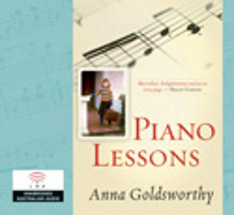Piano lessons by Anna Goldsworthy

Black Ink Press, 2009. Louis Braille Audio, 2010. ISBN 9781742124087.
Highly recommended. Audio book. Biography. A mesmerizing insight into
the relationship between teacher and pupil is told in this audio
version of Anna Goldsworthy's award winning story Piano lessons. In
this homage to her teacher, Goldsworthy gives a candid account of her
lessons from the first day. She was advised to find another teacher
when her current teacher, a jazz musician, felt she had learnt all she
could from him. Her family was advised that their daughter should
audition for lessons with Eleanora Sivan, a woman brought up in the
strict discipline of Russian piano teaching. Taught within the European
tradition she was only one or two people away from the famous composers
of the nineteenth and early twentieth centuries, and this vast
experience was handed on to Goldsworthy.
From these accounts of her youthful lessons to when she became a
concert pianist of world repute, Anna Goldsworthy's teacher, Eleanora
Silvan, shines through. Encouraging, yet aloof, vigilant and critical,
giving a rich background to the various pieces Goldsworthy learnt, Mrs
Silvan's force of character is obvious from the start and as we listen
to this marvellous recording, her presence can be felt.
Anna Goldsworthy's compliment to the teacher is in every word, as the
woman berates her pupil for not feeling the music, or not knowing about
the composer, or not putting enough expression into a piece, or
shrugging when she makes a mistake on stage.
At first, Mrs Silvan told Anna's father that the girl would not make a
concert pianist, but Anna decided that this was to be her aim, and so
practising four hours a day became a norm. Through her years at high
school, Goldsworthy worked hard at piano as well as her classes at
school, but keeping her cleverness to herself. Only when the first of
many accolades was given to her did some of her peers realise her
talent.
With Mrs Silvan's one word, 'Not', ringing in her ears, Goldsworthy
kept hard at work, refining her piano playing, learning all about the
composers and their work, and entering competitions. Each competition
was a stepping stone and yet Mrs Sivan kept reminding her that she
should play for herself, not for a competition where other people's
opinions were more important than her own. At the end of year 12,
interviewed for The Advertiser, Goldsworthy gave glib answers to the
inane questions and was reported without thought. Mrs Sivan was
devastated and it took some strength of character for Goldsworthy to
regain the footing that she had with her teacher. The strength of the
teacher, Mrs Sivan, was equally present in the pupil. And now, that
strength, knowledge and heritage is being passed onto a new generation
of pupils through Goldsworthy's teaching and stage presence.
Beautifully read by Jane Nolan, the text is enriched by the subtlety of
her voice and the nuances of tone which underline the feelings of the
main characters. Her rendition of the voice of Mrs Sivan is remarkable,
giving a richness to her accented pronouncements and the stress on the
word, 'Not', is enough for the listener as well as the pupil to sit up
and take notice.
Fran Knight